The “Odyssey” is a sequel to the “Iliad” and follows the adventures of Odysseus as he tries to return home from the Trojan War. This epic is a tale of cunning and cleverness, perseverance, and the struggle against the odds. Themes of homecoming, loyalty, and the human spirit pervade the work.
Short Summary of The Odyssey
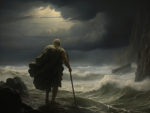 “The Odyssey” follows the adventurous journey of Odysseus as he attempts to return home from the Trojan War. Along the way, he encounters a myriad of mystical creatures, gods, and goddesses who either aid or hinder his progress. Meanwhile, back in his homeland of Ithaca, his wife Penelope fends off a host of suitors vying for her hand in marriage, believing Odysseus to be dead.
“The Odyssey” follows the adventurous journey of Odysseus as he attempts to return home from the Trojan War. Along the way, he encounters a myriad of mystical creatures, gods, and goddesses who either aid or hinder his progress. Meanwhile, back in his homeland of Ithaca, his wife Penelope fends off a host of suitors vying for her hand in marriage, believing Odysseus to be dead.
The story is as much about the struggles and strategies of Penelope and their son Telemachus as it is about Odysseus’s trials. With its timeless themes of heroism, cunning, and the enduring human spirit, “The Odyssey” remains an essential read that explores the complexities of homecoming, identity, and what it means to be a hero.
Comprehensive Synopsis Book by Book
This expanded synopsis offers a detailed view of each stage of “The Odyssey”, highlighting the intricate narrative woven by Homer.
Book 1: The Gods’ Council and Telemachus’ Plight
In the opening book, the gods discuss Odysseus’ fate on Mount Olympus. Athena, the goddess of wisdom, advocates for him. Back in Ithaca, Odysseus’ son, Telemachus, is overwhelmed by the suitors seeking Penelope’s hand in marriage, who are wasting the family’s resources. Athena visits Telemachus in disguise and advises him to search for news of his father.
Book 2: Telemachus’ Assembly
Telemachus calls an assembly to address the issue of the suitors. Despite facing opposition and ridicule, he decides to set off in search of his father. The suitors plot against him, planning to ambush him on his return journey.
Book 3: Telemachus Visits Nestor
In Pylos, Telemachus visits Nestor, an old friend of his father, who narrates stories from the Trojan War but has no news on Odysseus’ whereabouts. Telemachus is then advised to visit Menelaus in Sparta.
Book 4: Telemachus with Menelaus
In Sparta, Menelaus recounts his own adventures returning from Troy and mentions having heard that Odysseus is trapped on Calypso’s island. Meanwhile, the suitors learn about Telemachus’ voyage and plot to kill him.
Book 5: Odysseus and Calypso
Odysseus is found on Calypso’s island, where he has been held captive for seven years. Following Zeus’ orders, Calypso lets Odysseus leave. He builds a raft and sets sail for home, although his journey is hindered by Poseidon, who is angry with him.
Book 6: Odysseus and Nausicaa
Odysseus lands on the island of the Phaeacians. He meets Nausicaa, the king’s daughter, who helps him gain an audience with her parents, the king and queen.
Book 7: Odysseus at the Court of Alcinous
Odysseus receives a warm welcome at the court of King Alcinous. He is promised safe passage home but does not yet reveal his full identity or story.
Book 8: The Phaeacians’ Banquet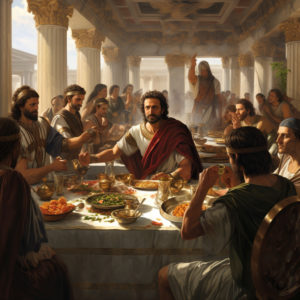
At a grand banquet in his honor, Odysseus remains unrecognized but is moved to tears by a bard’s tale of the Trojan War. His reaction sparks curiosity, leading to him revealing his identity and recounting his adventures.
Book 9: The Cyclops
Odysseus narrates the terrifying encounter with the Cyclops Polyphemus, where he uses his wit to escape, but in doing so incurs the wrath of Poseidon, Polyphemus’ father.
Book 10: Aeolus, Laestrygonians, and Circe
Odysseus describes his experiences with Aeolus, the Laestrygonians, and the witch Circe, who turns his men into pigs. With Hermes’ help, Odysseus overcomes Circe’s enchantment and she advises him to visit the Underworld for guidance.
Book 11: The Underworld
Odysseus visits the Underworld, encountering various spirits, including the prophet Tiresias who gives him advice and foretells the trials he will face on his journey home.
Book 12: Sirens, Scylla, and Charybdis
Odysseus recounts navigating the perilous straits between Scylla and Charybdis and resisting the enchanting song of the Sirens. They make the fatal mistake of stopping at Thrinacia, leading to disastrous consequences.
Book 13: Return to Ithaca
Odysseus finally returns to Ithaca with the help of the Phaeacians. Athena disguises him as a beggar to protect him until he can confront the suitors.
Book 14: Odysseus and Eumaeus
Odysseus, in disguise, meets his loyal swineherd Eumaeus and learns about the situation in Ithaca and the suitors’ behavior.
Book 15: Telemachus Returns
Telemachus returns from his voyage, evading the suitors’ ambush. He first goes to Eumaeus’ hut, where he reunites with his father, although he does not recognize him yet.
Book 16: The Recognition
Odysseus reveals his true identity to Telemachus, and they formulate a plan to take revenge on the suitors.
Book 17: The Beggar at the Palace
Odysseus, still disguised as a beggar, enters his palace and observes the suitors’ disgraceful behavior, maintaining his disguise even in front of Penelope.
Book 18: The Beggar’s Fight
Odysseus gets into a fight with another beggar at the palace but is careful to conceal his true identity and strength.
Book 19: Penelope and the Bow
Penelope decides to end the suitors’ competition by proposing a contest using Odysseus’ bow, which only the true king can string.
Book 20: Omens and Preparations
Odysseus and Telemachus make final preparations for the upcoming confrontation, with signs and omens indicating the gods’ support.
Book 21: The Contest of the Bow
Odysseus, still in disguise, takes part in the contest, managing to string the bow and shoot an arrow through twelve axes, revealing his true identity.
Book 22: The Killing of the Suitors
Odysseus and Telemachus, with the help of a few loyal servants, kill all the suitors in a fierce and bloody battle.
Book 23: Reunion with Penelope
Odysseus finally reunites with Penelope, who tests him to ensure he is her true husband. They share a joyous reunion.
Book 24: The Resolution
The final book sees a resolution between Odysseus, the families of the suitors, and the gods, securing peace and prosperity for Ithaca under Odysseus’ rule.
Basic Info About The Odyssey
- Author: Homer
- Date of Publication: The exact date is unknown, but it is estimated to have been composed in the 8th century BCE.
- Original Language: Ancient Greek
- Genre: Epic Poem
- Length: The poem consists of 24 books or sections.
- Form and Structure: The poem is written in dactylic hexameter, a traditional metric scheme for epic poems.
- Setting: The narrative traverses various locations around the Mediterranean, including Troy, Ithaca, and the seas surrounding Greece.
- Themes: Adventure and heroism, loyalty, vengeance, the intervention of the gods, and homecoming.
- Publication Medium: Initially, it was transmitted orally and was later transcribed onto parchment.
- Diction: The language is formal and grandiose, using epic similes, repeated epithets, and invoking the muse, which was characteristic of ancient Greek epic poetry. It contains a rich array of archaic words and phrases, which convey a sense of the heroic and mythical world it depicts.
Main Characters Overview
Odysseus
Odysseus is the protagonist of the epic, a seasoned warrior and king of Ithaca. Though middle-aged, he embodies both physical prowess and intellectual depth. Throughout the Odyssey, he displays cunning and strategy, famously devising the Trojan Horse during the Trojan War. As he navigates the trials on his way home, his ingenuity and leadership are continually tested. His journey also reveals a deeper, more contemplative side as he faces loss and longing, yearning for his homeland and his faithful wife, Penelope.
Penelope
Penelope is Odysseus’ wife and is left to manage the kingdom of Ithaca in her husband’s absence. She embodies patience, loyalty, and wit. Despite being pressured by suitors who wish to marry her (believing Odysseus to be dead), she remains faithful and concocts various strategies to keep the suitors at bay. Her intelligence is reflected in her strategic delaying tactics, like the unraveling of the shroud she weaves by day. Throughout the story, she maintains hope and faith in her husband’s return.
Telemachus
Telemachus is the son of Odysseus and Penelope. At the onset of the epic, he is a young man coming of age, feeling the pressure of his father’s legacy and the chaotic state of his homeland due to the invasive suitors. As the story unfolds, he embarks on a journey of self-discovery, seeking information about his father and gradually stepping into the role of a leader, embodying courage and wisdom, traits he inherits from both his parents.
Athena
Athena, the goddess of wisdom and warfare, plays a significant role as Odysseus’ divine protector. Throughout the Odyssey, she intervenes on his behalf, guiding and assisting him in his trials. Her role highlights the theme of divine intervention and fate, as well as illustrating the close relationship between the gods and humans in ancient Greek culture. Athena is also a mentor figure to Telemachus, encouraging him to step up as a leader and find information about his father.
Polyphemus
Polyphemus, a Cyclops and the son of Poseidon, is one of the notable antagonists in the story. His encounter with Odysseus marks a significant turn in the epic, bringing Poseidon’s wrath upon Odysseus. Polyphemus is depicted as a brutal, uncivilized figure, contrasting sharply with the resourceful and civilized Odysseus. His role in the story serves to illustrate the challenges and dangers that Odysseus must navigate on his journey home.
Circe
Circe is a goddess and enchantress who initially poses a threat to Odysseus but later becomes an ally. She is known for her magical abilities, using them to transform Odysseus’ men into swine. However, after Odysseus confronts her, she reverses the spell and becomes a helpful figure, providing guidance and assistance for the next leg of his journey. Her character showcases the theme of transformation and the complex nature of the gods in the Greek pantheon.
Context
“The Odyssey”, a cornerstone of ancient Greek literature, was composed by Homer around the 8th century BCE. It mirrors the social, political, and cultural facets of ancient Greece, portraying their values, norms, and mythologies. Homer may have drawn from existing oral traditions and folklore to craft this epic narrative, intertwining historical elements with mythical ones to create a rich tapestry of heroism, adventure, and divine intervention. While the exact historical context and personal experiences of Homer remain a mystery, it is widely believed that the poem reflects the complex and vibrant civilization of ancient Greece.
Comparison with Other Works
Homer, credited as the author of both “The Iliad” and “The Odyssey”, showcases contrasting thematic focuses in these works. While “The Iliad” centers on the rage of Achilles during the Trojan War, offering a grim view of warfare and its consequences, “The Odyssey” follows the arduous journey of Odysseus, highlighting themes of perseverance, cleverness, and homecoming. Both epics, however, stand as monumental works in the epic poetry tradition, characterized by their grand narratives, heroic characters, and the intertwining of mortals and gods, thus establishing a complex and vivid picture of ancient Greek society and mythology.
Reception and Criticism
Since its inception, “The Odyssey” has been celebrated as one of the greatest achievements of ancient Greek literature. Its literary excellence, depth of characters, and narrative complexity have continued to captivate audiences for centuries. Over time, it has undergone various analyses and criticisms, focusing on its structure, narrative style, and underlying themes. Modern criticism often explores its portrayal of gender roles, particularly the characterization of Penelope and the role of women in ancient Greek society. The work’s lasting impact is reflected in its continual study and adaptation, holding a central place in the literary canon and influencing countless works throughout literary history.
Comparative Analysis
Comparing “The Odyssey” with other contemporary works or those from neighboring cultures reveals a shared penchant for epic storytelling, a common trait in ancient literary traditions. Similar narratives can be found in ancient Mesopotamian literature, such as “The Epic of Gilgamesh”, which also revolves around heroic adventures and the exploration of mortality and humanity. Despite the regional variations, these works showcase a universal inclination towards grand narratives that explore the human condition, moral values, and the relationship between gods and men.
Adaptations
- Film: “O Brother, Where Art Thou?” (2000) by the Coen Brothers is a modern, loosely adapted retelling of “The Odyssey” set during the Great Depression.
- Literature: Margaret Atwood’s “The Penelopiad” (2005) retells the story from Penelope’s perspective, exploring themes of femininity and narrative reliability.
- Theatre: “The Odyssey” on Broadway, a stage adaptation directed by Mary Zimmerman, captures the narrative through a dynamic theatrical lens.
- Visual Art: Famous painters like J.W. Waterhouse and Gustave Moreau have created artwork inspired by Odysseus’ journey, depicting various scenes from the epic in their paintings.
- Video Games: While not a direct adaptation, games like “Assassin’s Creed Odyssey” (2018) integrate elements and themes from “The Odyssey” into their narratives, allowing players to explore a version of ancient Greece.
Interesting Facts
- Oral Tradition: Before being transcribed, “The Odyssey” was passed down through generations as an oral narrative, a testament to the powerful memorization and narrative techniques of the ancient Greeks.
- Homeric Question: The authorship of “The Odyssey” is subject to what is known as the “Homeric Question,” a scholarly debate regarding whether the epic was written by a single individual, Homer, or was a collective effort of several poets over time.
- Historical Influence: “The Odyssey” has had a profound influence on Western literature, inspiring a multitude of works across various genres and mediums, including literature, film, and television.
- Odysseus’ Character: The protagonist, Odysseus, appears in other significant Greek works, including “The Iliad,” where he is depicted as a brilliant strategist during the Trojan War.
- Astronomical References: Some researchers have argued that the astronomical references in the poem align with the positions of celestial bodies in the 12th century BCE, leading to debates about the actual timeline of the events depicted in the story.
- Female Characters: The epic is noted for its rich and complex female characters like Penelope and Athena, who play vital roles in the narrative, which was somewhat unusual for literature of the time that often sidelined female perspectives.
- Translations: “The Odyssey” is one of the most translated works in the world, available in numerous languages and various adaptations, highlighting its universal appeal and enduring relevance.
- Odyssey in Modern Vocabulary: The word “odyssey” has entered the modern vocabulary to denote a long, adventurous journey or quest, indicating the substantial impact of the epic on contemporary language and culture.
A Futuristic Blueprint in “The Odyssey”
In a modern literary climate that frequently labels classical texts as relics, I propose that “The Odyssey” actually presents a futuristic blueprint for narrative complexity, one that contemporary storytellers should strive to emulate.
Its non-linear narrative structure, with intricately interwoven plotlines and perspectives, can be seen as a forerunner to the sophisticated narrative techniques of today’s high-concept series and films. Moreover, Odysseus serves as an archetype of a complex protagonist, embodying a blend of heroic virtues and all-too-human flaws, offering a character blueprint that feels more authentic than many modern portrayals.
Furthermore, “The Odyssey” showcases powerful and nuanced female characters, long before the modern literary discourse began emphasizing the need for strong female representation. Characters such as Penelope and Athena break stereotypical molds, embodying intelligence and strength, making them relevant and revolutionary even in today’s narrative landscape. Thus, instead of relegating “The Odyssey” to the past, we should regard it as a timeless narrative masterclass, continuing to inspire and instruct generations of storytellers in crafting captivating, universally resonant tales.
🔥 Agree that Homer is a genius or just a grand scammer? 🤔 Unleash your boldest takes in the comments! #OdysseyDebate 🔥
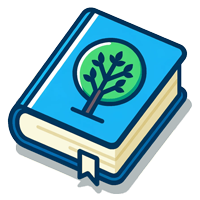
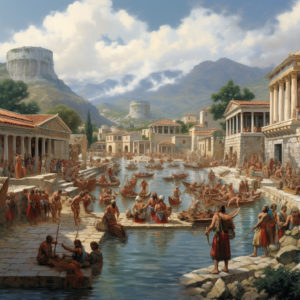
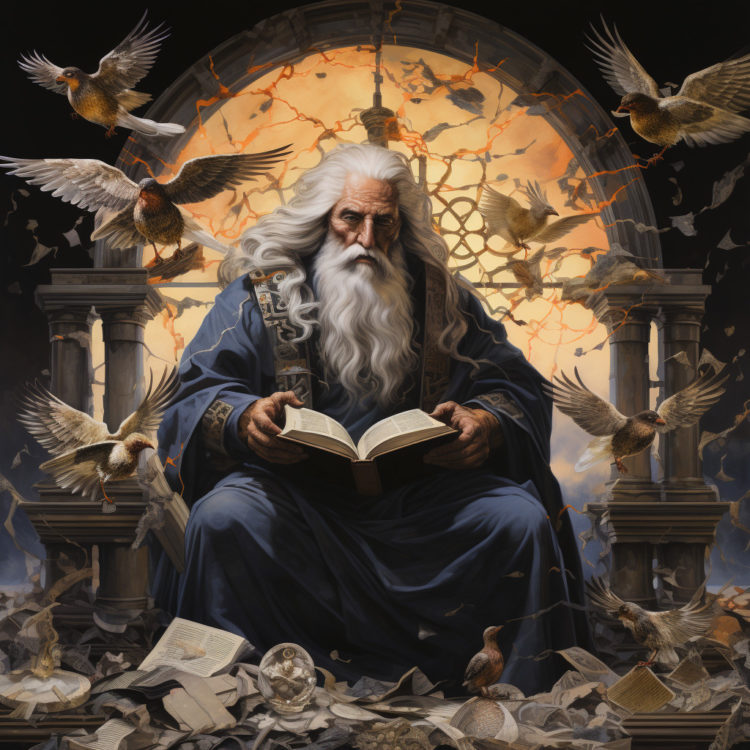
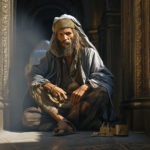
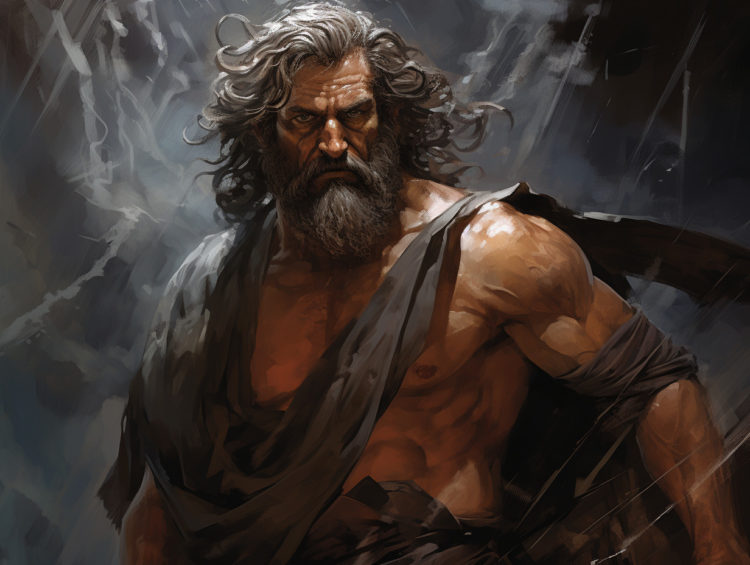

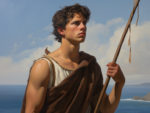
Comments